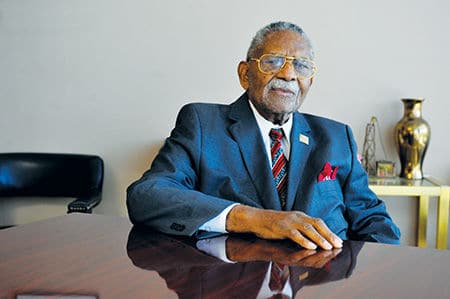L. Clifford Davis has spent his lifetime advocating for fairness and civil rights, partly because he grew up in the South in the era of segregation and experienced racism first hand.
But mostly because he believes that equality in education, housing and employment and removing barriers to any bus seat and restroom is best for everyone.
“All of this is good for the general public and benefits society as a whole,” said Davis.
Davis, who turns 91 In October, experienced not only the inequity of segregation but the physical pain of being stoned by white children on his way to school as a youngster in rural Arkansas.
As a young man, Davis was inspired to become a lawyer by the civil rights work of Scipio Jones, a black attorney who led the successful appeals of 12 black sharecroppers sentenced to death for participating in a race riot in the rural town of Elaine in the Arkansas Delta in 1919.
Davis graduated from historically black Philander Smith College in Arkansas in 1945. He then began law school at historically black Howard University in Washington, D.C.
Davis left law school to attend graduate school at Atlanta University but then decided to return to law school and took the bold step of seeking admission to the segregated University of Arkansas. In 1948, he became the first black person to be admitted but decided to return and finish at Howard in 1949.
However, his challenge of Arkansas’ admission policies opened the door for other blacks to attend professional schools.
Shortly after graduating, he moved to Texas to work in Fort Worth, which had a shortage of black attorneys. He challenged segregation policies in the Mansfield and Fort Worth school districts and filed education equality lawsuits similar to Brown v. Board of Education of Topeka.
Davis was involved in many civil rights cases challenging segregation policies in housing, employment and education.
He organized the Fort Worth Black Bar Association in 1977. In 1983, he was appointed by Gov. Mark White to serve as a criminal district court judge and won re-election to serve until 1988. He then served as a visiting district judge and senior district judge from 1989-2004.
He continues to practice law with the Fort Worth firm of Johnson, Vaughn & Heiskell and continues to take on pro bono clients. He was a long-serving volunteer with Legal Aid of NorthWest Texas and the NAACP Justice Project.
Davis has received many honors and awards over the years, including the NAACP’s William Robert Ming Award and the Blackstone Award, the highest honor given by the Tarrant County Bar Association.
He was also inducted into the National Bar Association’s Hall of Fame and is a 2015 winner of a Lifetime Achievement Award from Texas Lawyer. The Fort Worth Independent School District named a school in his honor, the L. Clifford Davis Elementary School.
“He is a real jewel and we have been fortunate to have had him in our community for such a long time,” said Fort Worth attorney Roland Johnson, a past president of the State Bar of Texas. “He has ruffled some feathers over the years but he always does it with courage and grace.”
Johnson said Davis has an uncanny ability to see the future “clearer and earlier” than most people.
Davis said his sense of clarity has always come from his heart and his passion for fairness and justice for everyone.
Which legal case in American history do you see as the most influential? Why?
Brown v. Board of Education is perhaps most influential case in the recent period because it impacted such a broad range of ideas about race relations in the United States.
What inspired you to become an attorney?
I followed the career of an attorney in the state of Arkansas and his effort for justice and equality in the community, and his lifestyle. I was impressed and wanted to pattern my life effort like I perceived his.
What is your most significant professional achievement?
I believe my service on the Drug Diversion Court to be a significant service to the community. It was the first Diversion Court in the local judicial system and now I understand there are 10.
What motivates you?
I believe I have a civil responsibility to devote my time and talent to promote the general welfare of the community.
What are the major challenges facing young attorneys?
The young attorney is challenged to find a way to use his/her time and talent to live a comfortable lifestyle and contribute to the general welfare of the community.
Do you have a specialty area of practice?
I limit my practice because of my age to no-contested services for clients.
– Marice Richter






